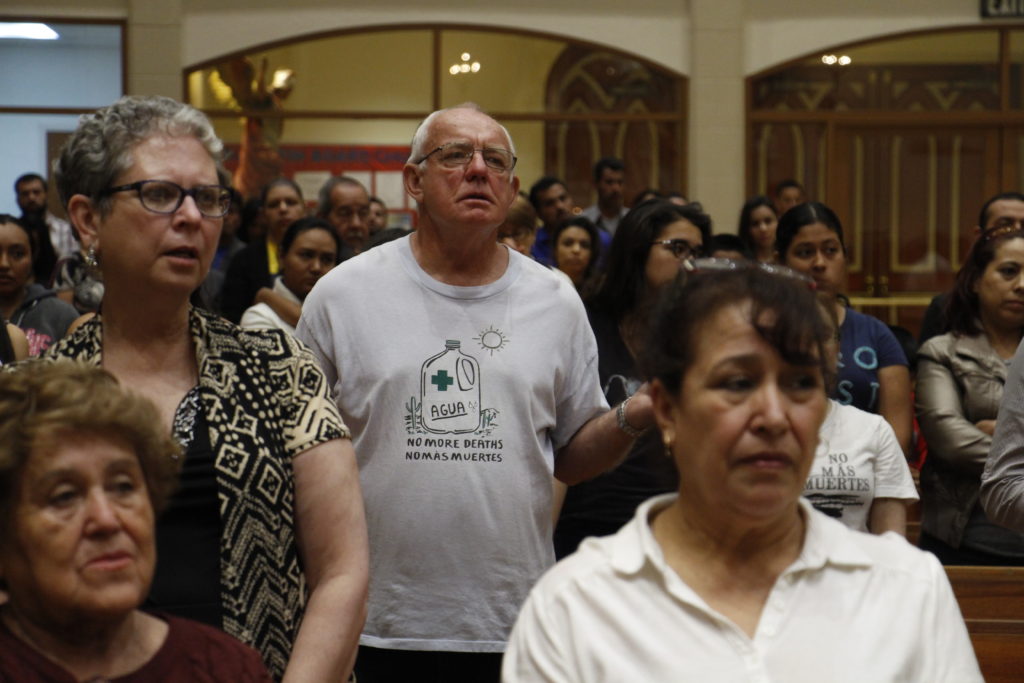The first Friday of the 2015 Lenten season had local Catholics reflecting on death and its prevention for the countless immigrants longing for U.S. soil.
A Feb. 20 procession, Mass and panel discussion drew peaceful and prayerful attention to the challenges immigrants face in their homelands plus ideas on how to help. Each part of the Mass for Migrants event aimed to bring the issue of immigration to the personal level.
The 100 or so laypeople, priests and religious who walked the half-mile trek from the Diocesan Pastoral Center to Immaculate Heart of Mary Parish carried a small, colored wooden cross with them. Each one bore the date of death of someone who died trying to cross the international border in 2013 or 2014. Some could not be identified and were known simply as unknown brother.
Many carried two or three crosses. One woman carried seven.
Auxiliary Bishop Eduardo A. Nevares, who led the evening’s procession, emphasized that there could easily be more crosses. He said the prayers that night were for the more than 391 souls “that we know of” who gave their lives trying to ensure a better tomorrow for themselves or their families.
He prayed that the Church be a welcoming family of God and give welcome to those who remain. Leaders read the names and approximate dates of death of each migrant throughout the somber procession. Every processional cross bearing those names remained on display throughout the liturgy and panel discussion. An image of the Blessed Mother, who under her title of Our Lady of Guadalupe, is patron of the Americas, kept watch over them.
Bishop Nevares said it’s important to increase awareness of the human tragedy that occurs because of the broken immigration system. While discussion continues at the political level, at the human level, “real people and real families are in dire need,” the bishop said.
“It’s not easy to be an immigrant,” he continued in his bilingual homily. “Just think of those immigrants being persecuted now in the Middle East running for their very lives.”
“The main thing is to transform people’s hearts.”
It was the plight of the migrant that inspired Tom McCabe to organize the Mass for Migrants and the activities that sandwiched it. The St. Timothy parishioner was moved by a “Dying to Live” movie he saw during a Just Faith class at the Mesa parish. He couldn’t imagine dying alone with no one to pray over you.
“The main thing is to transform people’s hearts,” McCabe said.
They had a chance to do that after hearing Gina Sanchez’s painful recounting of crossing the Arizona Sonoran desert 14 years ago. The first time she tried, it was a cold journey.
“I can never forget the little faces that I saw that could no longer walk. Every step seemed so far away,” Sanchez said with the help of a translator.
She stayed with a group who could no longer walk and U.S. Border Patrol caught them. Sanchez saw children’s feet damaged from the long journey. Her heart still breaks at the thought.
Once she successfully crossed, Sanchez sold tamales to make money. In 2010 she spent 103 days at the state Capitol during discussions about SB1070 asking for action and prayer. Sanchez continues encouraging families today to file their paperwork and continue holding hands.
“It can all happen with faith and action,” said Sanchez, who also volunteers with Promise Arizona, which helps people became effective change agents in the community.

Sanchez was part of a five-member panel that discussed the state of the immigration problem from a legal, Catholic and humanitarian perspective. Bishop Nevares, offered initial thoughts.
“Five million people are migrating today because they’re looking for better opportunities, housing, prosperity or they’re running for their lives,” said Bishop Nevares, who serves on the U.S. Bishops’ Committee on Migration. “We need to open our hearts and our doors to them.”
The panelists weighed in on what Catholics on this side of the border can do now to help the migrant situation. The bishop acknowledged that those who are bicultural are often patient and mild. He said it’s time to speak up and demand rights and be a voice for the voiceless. He encouraged Catholics to use the media to remind the public that immigrants have human rights.
Emilia Bañuelos, a local immigration attorney who has been on the beat since 1970, said to continue pressuring Congress for reform. She said some of history’s worst laws has separated families, but can see the light at the end of the tunnel.
Chelsey DiPasquale-Hunton with the humanitarian aid group, No More Deaths, is also optimistic. She said there’s still work to do, but it becomes easier as more see immigration as a “people situation.”
“The work can be overwhelming, but don’t forget the little ways to help. If one person can take one gallon of water and make it, then that’s helping,” DiPasquale-Hunton said.






